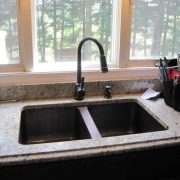Plumbing Tips for Beginners
Some homeowners avoid plumbing tasks because they can be difficult and messy. As a result, a plumber is called for minor problems that could easily be handled. Others address complex plumbing projects, often with disastrous results.
Plumbing advice
You can determine which projects you feel comfortable with. Step-by-step instructions will help you to successfully complete the projects you decide to accomplish.
Normally all exposed pipes (which are not hidden in walls) can easily be worked on by a skilled person with no special knowledge or skills. Taps and traps can be disassembled and clogs can be repaired or replaced using low cost tools. On the other hand, trips to the hardware store to get spare parts usually take more time than the task itself.
You can replace a bathroom sink quickly, but a sink in the kitchen, with its mass plumbing underneath is a big job. The plumbing and accessories that are partially hidden, like a shower faucet and supply lines may require carpentry, tile work, and other skills.
Every time you install a plumbing fixture where there was not one before (in other words, every time you need to place new pipes) a new difficulty is introduced into your task. In addition, new plumbing must meet codes and must be inspected by the local construction department.
How to do plumbing work
Often, the most difficult part of a job is not the actual plumbing, but to mediate with the obstacles. You may have to get into small rooms; Use a knee pad, canvas, or even an old pillow to make the workplace as comfortable as possible. Use a flashlight so you can see clearly.
There is a basic rule for most plumbing projects: Turn off the water and try to make sure the water is off. Keep a bucket and some old towels on hand to pick up the small amounts of water that may drip from the pipes.
Do it yourself with these plumbing tips:
If you are skilled and able to work methodically, most plumbing projects are within your reach. However, some require a lot of time and involve skills beyond plumbing. Understanding your limits and time constraints can ensure a pleasant project.
Plan your time carefully; your family will not be able to use a plumbing fixture until you have finished repairing or installing. The checklist at the beginning of each project will help you gather the necessary tools and you can assess the time needed to complete the project.
Even a well-planned project may have unforeseen problems. You might need additional tools or pieces, so working while shops are open is a great success.
Working safely and comfortably
Before performing any plumbing work turn the water off. Then open a tap to confirm that the water supply is turned off.
Be careful not to touch the electrical outlets nearby, especially if you are wet.
Plumbing can be physically demanding, because they often have to work in tight areas. Making the workplace as comfortable as possible is very important.
Hiring a professional
Even if you think you are competent to do the job, you may not have the time. Instead of forcing your family to live in a work space for days to months, it may be worth the extra money to hire someone who can get the job done quickly. More importantly, local codes may require licensed contractors to perform certain types of work.
Choosing a Plumber
For extensive work, get quotes from two or three plumbers. Ask for referrals and talk to previous clients to see if they were satisfied. Make sure the plumbing contractor is licensed and able to work in your area and that they have liability and worker’s compensation insurance so you will be protected in case of an accident.
The levels of plumber participation
Most professional plumbers prefer to do all the work themselves. However, if you feel confident that you can work on a project and need only a little peace of mind, a plumber may agree to work as a consultant.
If you are not satisfied with the work of a plumber, or if you do not understand what the plumber is doing, do not hesitate to ask questions.
Be firm but polite. Whenever possible, save all your questions for the end of the day so it will not be a bother. If you feel that the work is of poor quality or the plumber ignores your concerns, make it clear that you will not pay until you are satisfied and have all the work inspected.
Tools that protect
Most projects do not put you in danger. However, use common sense and take precautions to protect yourself and your home. If you are going to do a job that will make you wet, keep everything away from any receptacle or electrical accessory. To be safe, turn off the power at the service panel.
Make sure you know what the pipes are for each thing. In addition to plumbing pipes, your house may have gas pipes and pipes carrying hot water from the water heating system.
When working with gas pipes, turn off the gas at an earlier point where you are working and open the doors or windows to provide ventilation. Temporarily seal pipes with a cloth and keep the area ventilated.






